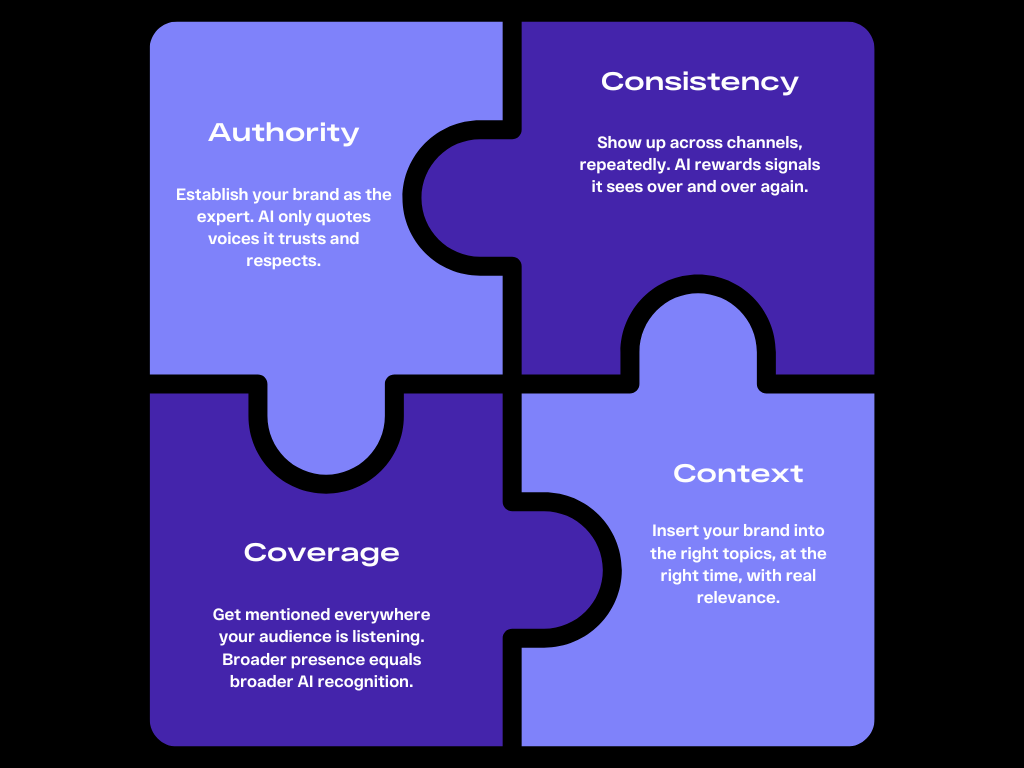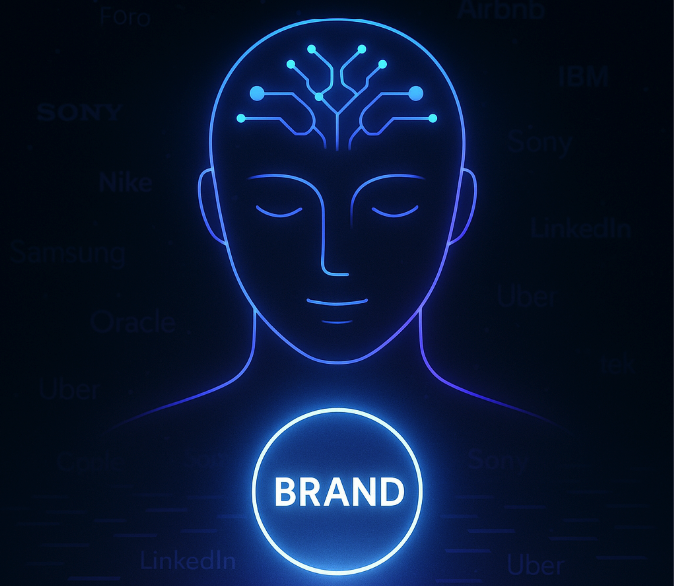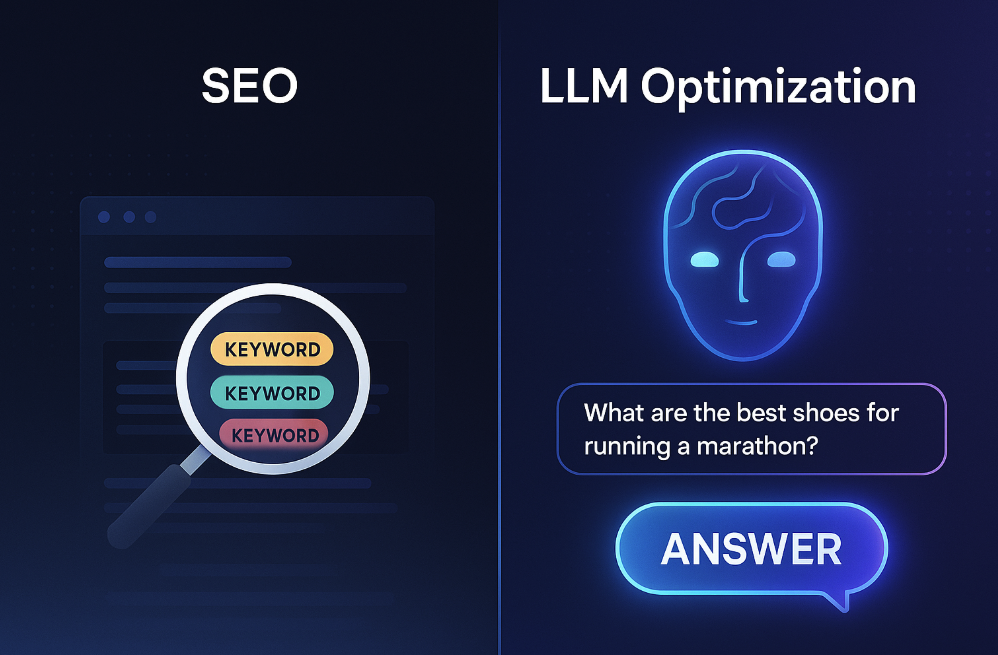
Let’s be honest. Most brands won’t show up in AI results. Not because they aren’t good, but because they aren’t visible where it counts.
You know what question I get asked more than anything lately?
“How do I get ranked in AI engines?”
Let me tell you something: it’s not that complicated. But it is a shift. And it’s a shift that should have PR folks dancing in the streets.
Because if you’re still funneling your marketing budget into paid clicks and waiting for the ROI fairy to deliver magic, you’re going to be invisible in the age of AI. Discovery doesn’t live in CPC spreadsheets anymore. It lives in synthesized, trust-loaded answers from ChatGPT, Perplexity, Gemini, and Bing.
And guess who owns trust? We do. PR.
Welcome to the Answer Economy

Generative AI and large language models (LLMs) are completely reshaping how consumers find information and how brands manage their online reputations. Traditional keyword-centric search is rapidly giving way to AI-generated answers powered by platforms like ChatGPT, Google’s Search Generative Experience (SGE), Bing Chat, and other emerging AI assistants. These tools deliver concise, authoritative summaries rather than conventional lists of links, offering quick access to trusted responses that often feel more credible than traditional search results.
Forget the list of blue links. Generative AI gives users answers. One authoritative, conversational summary that pulls from sources the LLM (Large Language Model) trusts. If your brand doesn’t show up in that AI-generated response, you’re not just lower in the rankings. You’re out of the conversation entirely.
Gartner estimates that search query volume will drop by 25% by 2026 as users shift to AI platforms. You may want to read that last sentence again. One in four traditional search opportunities is vanishing, and being replaced with a single AI generated response.
Don’t move now? That’s cool. Your rivals will gladly take your spot in the AI answer box.
The Evolution of Search: Welcome to Position Zero
Forget the endless list of ranked links. Generative AI search, powered by LLMs like ChatGPT, Google’s Search Generative Experience (SGE), and Bing Chat, is rewriting the rules by delivering single, synthesized answers. Instead of clicking through pages of results, users get direct, authoritative summaries that instantly answer complex queries. And here is the kicker: these AI summaries are quickly becoming the go-to for users, replacing the traditional search experience.
Search behaviors are already shifting fast. Recently, users relying on ChatGPT reached correct answers quicker and more reliably compared to those using traditional Google searches. But there is a catch. Once users trust an AI-generated response, they are far less likely to click through to original sources.
Trust is evolving alongside this shift. Today, roughly 41% of consumers trust AI-driven search results at least as much as traditional organic results, significantly more than paid ads. User adoption rates underscore this trend, with nearly 60% of consumers planning to increase their use of AI-driven search in the near future. Younger generations are already ahead of the curve, frequently opting for TikTok or AI chatbots instead of traditional search engines.
Generative AI also fundamentally reshapes the user’s search journey. Imagine asking Google’s SGE something hyper-specific like, “Where can I find a quiet breakfast spot near Grand Central Station that’s perfect for an early client meeting and has Wi-fi that doesn’t suck?” Rather than multiple searches, the AI synthesizes data from several sources into a single, direct recommendation . This “position zero” answer is quickly becoming essential for brand visibility. If you are not showing up in the AI’s curated summary, you are invisible.
Even voice search is getting in on the act. With voice assistants like Alexa and Siri increasingly delivering singular conversational responses, the stakes are higher than ever to become that one trusted recommendation.
But trust is delicate. Users perceive AI-generated answers as neutral, authoritative summaries, not ads. If ChatGPT calls your product best-in-class, users often trust it as a data-driven fact. Any misinformation, though, can rapidly erode user trust (more on these risks later).
Search giants are adapting fast. Bing integrates GPT-4 directly, while Google’s SGE now offers AI-generated “overviews” at the top of results, complete with source links and follow-up prompts. And it is working. Fewer clicks means fewer chances for traditional SEO and SEM tactics.
The New Performance Metrics
To rank in AI, you need:
- Authority – Be the expert AI trusts to quote.
- Consistency – Show up everywhere, all the time.
- Coverage – Own every angle of the conversation.
- Context – Align with what matters, when it matters.
And guess what? Public relations hits all four. Effortlessly.

Your brand is being trained into the AI knowledge base right now. These systems are fed by Wikipedia, news articles, Reddit threads, Crunchbase profiles, and authoritative web content. That glossy landing page your team obsessed over? Totally useless if no one is citing it.
But a sharp quote from your CEO in Fast Company? A Wikipedia page with credible citations? A punchy stat from your whitepaper placed in TechCrunch?
That’s the good stuff. That’s what the machines eat up.
Why PR is Perfectly Positioned
Traditional SEO is evolving into Answer Engine Optimization (AEO). And let’s be real: AEO isn’t new for us in PR. We’ve been crafting narratives, building authority, and seeding trust in all the places that matter for years.
PR is no longer the soft intro to your funnel. It is the funnel. We’re the ones making sure your brand is what AI remembers and repeats.
If PR feels intangible, you’re not doing it right. We’re delivering earned impact with bottom-line returns through a results-driven PR strategy built for the AI era.

In the age of AI, context is king. PR has always been in the business of context.
How Brands Make It Into AI Answers
If you want your brand to appear in AI-generated responses, you need to understand how these models “learn.” Unlike traditional search engines, which continually update their indexes, Large Language Models (LLMs) learn from massive data snapshots. Basically, if your brand isn’t part of those snapshots, you might as well be invisible.
Here’s the deal. Most LLMs, including OpenAI’s GPT models, learn from an enormous mix of public text sources. GPT-3, for instance, absorbed approximately 410 billion tokens from the web’s Common Crawl dataset (about 60% of its training data) alongside significant chunks from books, Wikipedia, and curated web sources.
The Must-Have Data Sources:
Websites & Blogs
Your corporate website, blogs, press releases (if it’s publicly accessible), chances are high it’s already been scraped into something like Common Crawl. But just being scraped isn’t enough. You need prominence, authority, and the right context to get noticed.
Wikipedia & Wikidata
Practically every major LLM uses Wikipedia as a foundational source. Having a well-cited Wikipedia page effectively “canonizes” your brand in the AI knowledge base. Wikidata also helps feed search engines and indirectly informs AI-generated responses.
News Articles & Press
If your brand consistently appears in authoritative news sites, AI learns that you’re credible and notable. Regular, context-rich mentions increase the likelihood that LLMs “remember” your brand when responding to relevant queries.
User-Generated Content (Forums & Social)
Platforms like Reddit significantly shape AI understanding of public opinion about your brand . Public forums, Twitter discussions, and even StackExchange Q&As contribute to AI’s perception, good or bad.
Company Listings & Professional Profiles
LinkedIn, Crunchbase, and similar platforms offer structured insights into your brand that LLMs absorb. Ensuring accuracy and completeness in these profiles improves AI’s baseline knowledge about your brand.
Structured Data
While structured data itself might not directly feed LLM training, it influences real-time AI search tools, rich results, and knowledge panels. Organizing your information clearly and accurately increases the odds that search-integrated AI tools pick you up.
Increasing Your AI Visibility:
Earn Your Coverage
LLMs prefer widely published, authoritative content. Get your brand into industry-leading publications and credible news sources through proactive PR. Not only does this enhance human discovery, it provides digital footprints essential for AI visibility.
Leverage Wikipedia (Ethically)
Wikipedia significantly boosts your AI credibility. Creating a properly cited Wikipedia page (following all guidelines on neutrality and notability) can make a huge difference in how prominently an AI features your brand.
Establish Authority through Context
If respected industry sources consistently reference your brand alongside authoritative names or trusted research, AI infers your credibility. Produce high-quality, original insights or proprietary research that industry leaders naturally cite.
From Indexed to Included:

So what’s the payoff? When someone asks generative AI, “Who leads in your industry?” your goal is straightforward. Ensure enough credible sources consistently affirm your authority so that your brand naturally emerges in AI’s synthesized answers. When your brand content is clear, authoritative, and widely referenced, it becomes not just visible, but unforgettable in the AI-driven digital landscape.
But showing up in AI doesn’t happen by accident. SEO is evolving fast. You are no longer optimizing just for Google. You are optimizing for language models that think more like people. This is where Answer Engine Optimization comes in.
SEO vs. LLM Optimization: What Actually Changes?
Let’s get one thing straight. SEO isn’t dead. But it is changing. Fast. You are not writing for bots anymore. You are writing for machines that understand nuance. That means structure, clarity, and trust.
SEO Fundamentals Still Matter
Search engines are still powering AI platforms. A study by Seer Interactive showed a 0.65 correlation between strong organic rankings and being mentioned by GPT-4. If you are ranking well, you are already in the running. But backlinks? Not as important. AI wants credible, relevant content, and not just links.

From Keywords to Concepts
AI does not tally keywords. It understands meaning. You need to think in topics, not terms. Someone might search for “best running shoes 2025” but ask the AI, “What are the best shoes for running a marathon this year?” Your content has to answer the second one.
This is conversational SEO. And it is about association. If your brand solves a real problem, make sure AI sees the connection. Spell it out. Connect your name to the category, the challenge, the customer pain point.
Structure Beats Style
AI does not care about clever. It wants clean. Use subheads. Use bullet points. Use lists. Make the answer easy to grab. Add FAQ sections and mark them up. Make your point first, then go deeper.
Start with a clear summary. That is what the machine will quote. Then expand for the human reader. Research shows AI tools pull from sharp, fact-first content over fluff.
Give It Soundbites and Stats
AI engines love quoting stats. Give them something worth repeating. A quote from your CEO. A clean stat from your survey. One test showed that adding a quote or stat boosted visibility in tools like Bing Chat and Perplexity by up to 40 percent.
“Search is no longer about ten blue links—it’s about being the trusted answer. And that means giving machines the signals they need to choose you.”
— Rand Fishkin, Co-Founder of SparkToro
Think in Follow-Ups
AI-powered search is not a one-and-done. Google’s SGE lets people ask follow-up questions. Your content should be ready. If they ask about your product, they will probably ask about pricing, setup, and competition next. Answer all of it.
Tech SEO Still Counts
Fast sites win. Mobile-friendly sites win. Crawlable content wins. AI tools will start reading your live content too. Make it easy to find, easy to load, and structured for context.
Test and Adjust
LLM optimization is still new. There are no fixed rules yet. Try stuff. Use AI tools like ChatGPT and Perplexity to ask the questions your customers would. See who shows up. If it is not you, fix that.

Human First. Machine Ready.
This is not about choosing between writing for people or writing for machines. You are doing both. Say something that matters. Back it up with facts. Make it impossible to miss.
This is the new frontier. And you are either getting cited, or getting left out.
The Stakes Are Higher Than Clicks
This isn’t just about traffic. It’s about trust. When an AI says you’re best-in-class, people believe it. When it doesn’t mention you at all, they don’t even know you exist.
You can’t buy your way into AI engines. You have to earn your spot.
So maybe it’s time we stop treating PR like a branding afterthought and start calling it what it is. Your unfair advantage in an AI-driven market. It’s not the fluff, but it’s the fuel.
And if you want the team already getting brands chosen by the machines and trusted by humans, you know where to find us.
Want to know how your brand stacks up in the age of AI-driven search? Let’s talk. SourceCode is already helping brands take back control of their digital visibility. And we’re just getting started.
Learn more about how SourceCode is redefining PR for the AI era





